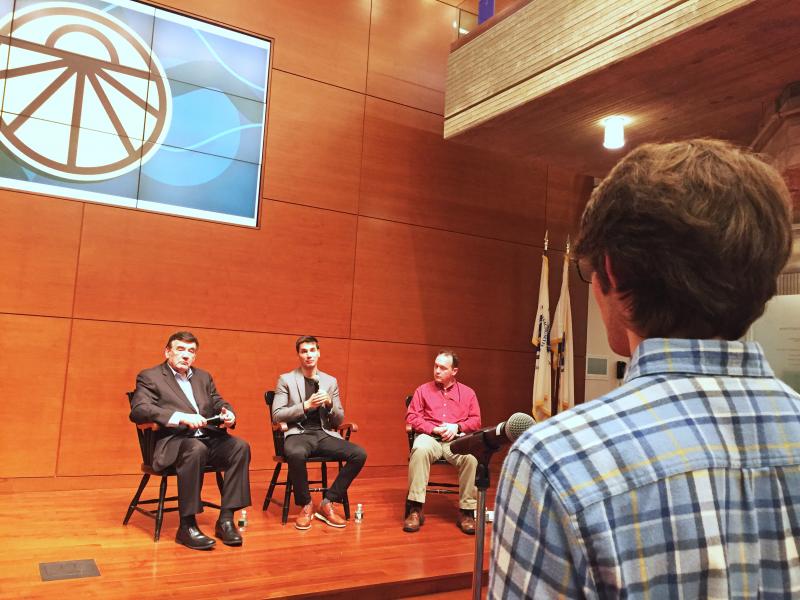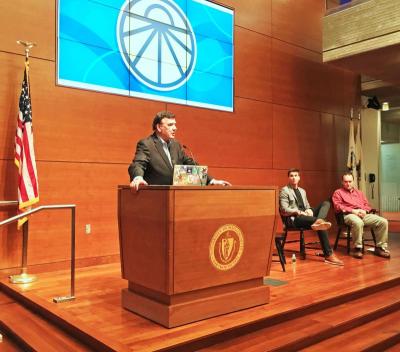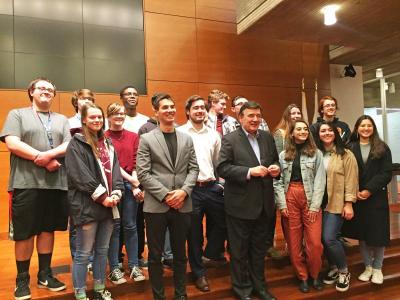Climate Change town hall held at UMass Dartmouth
The rise of 60-70 million climate-exasperated migrants around the world; No country being on track to reach their Paris agreement goals; Potential warming of 4.5 degrees Celsius by the end of the century, a figure nearly on par with the warming that occurred before the largest mass extinction on the planet.
These were many of the issues at the forefront of discussion at a climate town hall at the UMass Dartmouth library on November 22.
Topics included renewable energy, carbon taxes, and the Green New Deal as more than 50 students and community members came out to hear state senator Marc Pacheco, state representative Dylan Fernandes, and UMass Dartmouth Associate Vice Chancellor Greg Walters speak and answer questions.
The event was held by the UMass Dartmouth chapter of the Sunrise Movement, a national movement of young people advocating for political action on climate change, and hopes ran high before the meeting.
“Basically, we set this up as an opportunity for students to raise questions about climate change to our local representatives, so they can tell us what they can do to help,” said events co-chair Amanda Harlfinger.
Walters, one of the featured speakers, oversees campus facilities and master planning. “I’m hoping to see something where there’s an actionable item that we can start implementing,” he said. “You know, ‘go do this,’ and let’s go do it.”
Sophomore Cassidy Medeiros said, “I’m hoping in doing this I’ll learn more about the issue. And maybe make a difference once we know more about it, and how we can help.”
“I’d like to see what sort of initiatives are being done to go towards zero emissions and lowering carbon pollution, and things like that,” said sophomore Cristian Welcome, who works at the university’s sustainability office.
Walters spoke first, outlining what UMass Dartmouth is trying to do to reduce emissions. “We’re working hard to do that,” he said, before announcing that the university has just selected a company to help get it to net zero emissions by 2030.
He said that they have also set up a Chancellor’s Climate Committee, a group of people interested in climate issues who will be able to voice concerns directly to the university’s Chancellor.
The second speaker, state rep Dylan Fernandes, represents Falmouth, Martha’s Vineyard, and Nantucket — a lot of coastline, as he told the audience.
“The greatest issue facing us is the threat of climate change and global warming and its effects,” he said. “If we don’t do anything about it, by the end of our lifetimes, and certainly within our children’s lifetime, our planet will be largely uninhabitable.”
As a Millennial, Fernandes said, the problem hits close to home.
“It’s not some sort of far-off threat that I think a lot of people think it is,” he noted. “So we need to act with a lot more urgency than we have.”
He added that scientists first testified about global warming in Congress in the late 1980s, while the first United Nations panel on climate change was set up in 1988.
Yet since then, Fernandes noted, we’ve released more emissions than at any time before that.
“So we have been knowingly and complicitly killing ourselves and our planet for the past 30 years, and we’ve made it worse since we found out about it,” he said.
Fernandes proposed a variety of actions legislatures could take: carbon taxes, divestment bills, and a community empowerment bill to allow municipal governments to use their buying power to choose long-term contracts with clean energy projects.
State senator Marc Pacheco agreed with Fernandes that climate change should be a priority for lawmakers.
“I quite frankly am ashamed of the lack of action that the Massachusetts legislature has taken on this issue,” he said.
As a state, Pacheco noted, Massachusetts is number one on a range of measures. “But we could do so much more.”
He also pointed out that the climate change issue relates to environmental justice, public health, economic development, national security, and public safety.
“If people think we have an immigration issue today,” he said, “Wait ‘til there’s 140 million climate refugees.”
“There’s not a person living today who is 37 years old or younger that hasn’t seen the global temperature increase every year of their life,” he noted. “That’s pretty scary.”
“I’m also here to ask you to hold your legislators accountable,” he said. “Political leadership is also renewable.”
The panelists answered questions on a variety of topics, including offshore wind, forest fires in California, public awareness and education, ocean acidification, public transportation, and the 2020 election.
“Frankly, we’re gonna have to scale up on this, like the scale that we approached World War II,” said Fernandes at one point. “In terms of the total transformation of our economy, individuals, everyone pitching in and doing their fair share...And we are nowhere near that.”
But in spite of the doom and gloom predictions, the panelists seemed happy with the event.
“It was exciting to see young people here expressing their viewpoints,” said Senator Pacheco. “It’s so important that people get out and let their elected officials know how they feel about this most critical issue.”
“It’s an awesome turnout, and I think it was reflective of how this generation feels about climate change,” said Representative Fernandes. “As a millennial myself, this is the number one issue that’s gonna impact my generation and my children’s generation. And we need people fired up to create the change that we need.”















